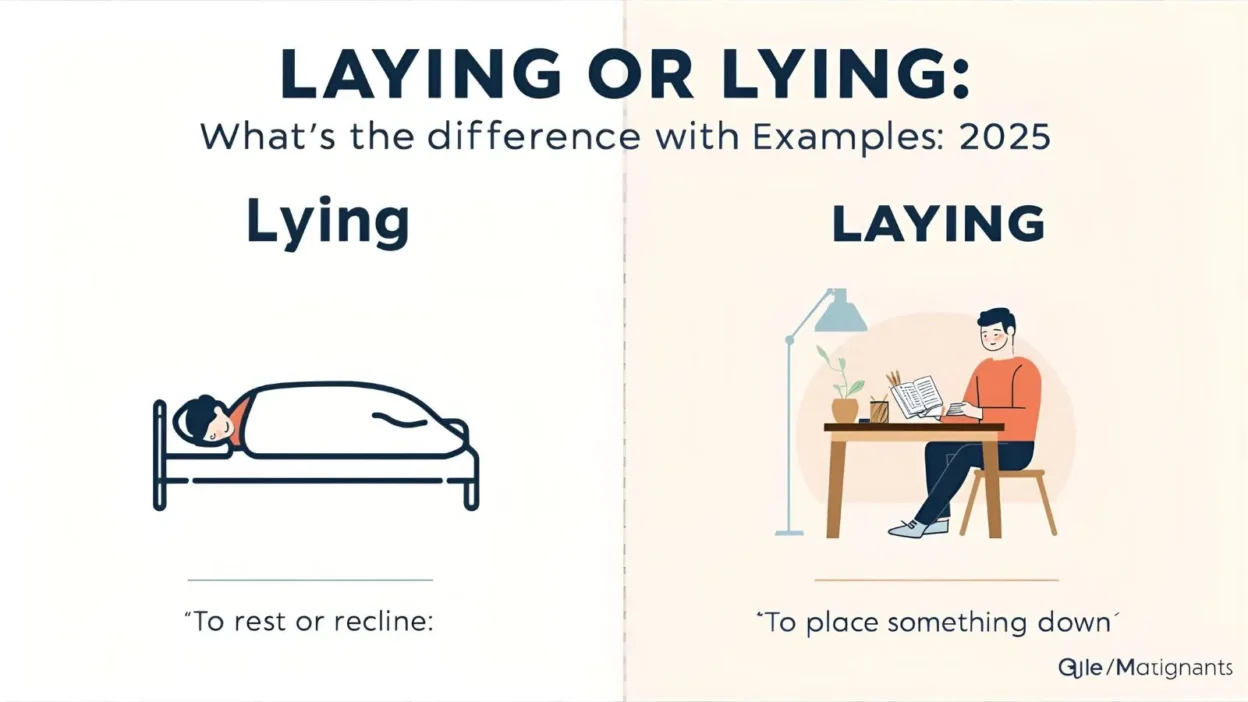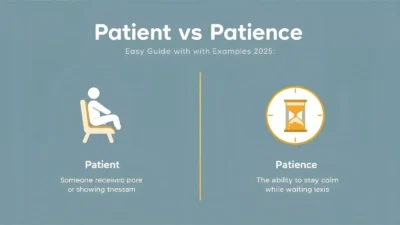Have you ever paused mid-sentence, unsure whether to write “laying down” or “lying down”? You’re not alone.
The words laying and lying confuse millions of English learners and even native speakers. The confusion comes from the fact that both words are related to the verb to lay and to lie, but they mean different things depending on context.
People search for “laying or lying” because they want a quick, clear rule they can use in everyday writing, whether for emails, school papers, or professional documents.
This article explains the difference in simple terms, covers the history of the words, compares British and American usage, and gives you real-life examples.
By the end, you’ll know exactly when to use laying and when to use lying.
Laying or Lying – Quick Answer
- Laying = putting or placing something down.
- Example: She is laying the book on the table.
- Example: She is laying the book on the table.
- Lying = resting, reclining, or not telling the truth (depending on context).
- Example: He is lying on the bed.
- Example: He is lying on the bed.
👉 Quick rule: You lay something down, but you lie down yourself.
The Origin of Laying or Lying
Both words come from Old English.
- Lay (Old English lecgan) meant “to put or place.”
- Lie (Old English licgan) meant “to rest or recline.”
Over time, the forms became similar, leading to confusion. The overlap worsened because lay is also the past tense of lie (yesterday I lay down), which makes the distinction even trickier.
British English vs American English Spelling
In both British and American English, the rules for laying and lying are the same. The difference lies in how often each form is used. Americans tend to simplify verbs, while British English preserves older forms.
Comparison Table – British vs American Usage
| Form | British English Example | American English Example |
| Laying | She is laying the papers neatly. | She is laying the groceries down. |
| Lying (rest) | He is lying on the sofa. | He is lying on the couch. |
| Lying (truth) | The witness is lying in court. | The witness is lying in court. |
Which Spelling Should You Use?
- If you’re in the US → Use the same rules, but expect “lying” to appear more in casual speech.
- If you’re in the UK or Commonwealth → Stick to traditional grammar; both forms are equally common.
- If writing globally → Follow the quick rule: lay = place something, lie = rest yourself.
Common Mistakes with Laying or Lying
- ❌ I am laying down on the bed.
✅ I am lying down on the bed. - ❌ The cat is lying the toy on the floor.
✅ The cat is laying the toy on the floor. - ❌ She was lay on the sofa.
✅ She was lying on the sofa.
Laying or Lying in Everyday Examples
- Email: I’ll be lying low this weekend after the conference.
- News: Workers are laying bricks for the new hospital wing.
- Social Media: Currently lying in bed, scrolling endlessly.
- Formal Writing: The report is laying the foundation for future research.
Laying or Lying – Google Trends & Usage Data
Google Trends shows “lying down” is searched far more often than “laying down.” Many people mistakenly use laying when they mean lying, which drives the searches.
Comparison Table – Search Popularity
| Phrase | Popularity (Global) | Common Use Case |
| Lying down | High | Talking about resting/reclining |
| Laying down | Medium | Often mistaken for “lying down” |
| Laying bricks | Low | Construction context |
FAQs:
Q1. Is it “I am laying down” or “I am lying down”?
Always use “lying down” when you mean resting.
Q2. Can animals be “lying” or “laying”?
Animals lie down to rest but lay objects (like birds laying eggs).
Q3. Why is this so confusing?
Because lay is both a verb (“to place”) and the past tense of lie.
Q4. Do British and American rules differ?
No, the grammar is the same; only word preference changes slightly.
Q5. Is “laying down the law” correct?
Yes—here laying means “setting down rules.”
Q6. Is “lying in wait” correct?
Yes—lying means “reclining/remaining hidden.”
Q7. How do I always remember the difference?
Rule: Lay = place something. Lie = recline yourself.
Conclusion
The difference between laying and lying often causes frustration, but the rules are simple once you break them down. Use laying when you’re putting something down and lying when you’re resting yourself or describing someone being untruthful.
While spelling rules don’t differ between British and American English, usage trends and common mistakes do. Whether you’re writing a casual text, a formal email, or academic work, keeping this rule in mind will prevent confusion and make your writing clear.
Remember: You lay objects. You lie yourself. This single rule solves 90% of the confusion around the words.



